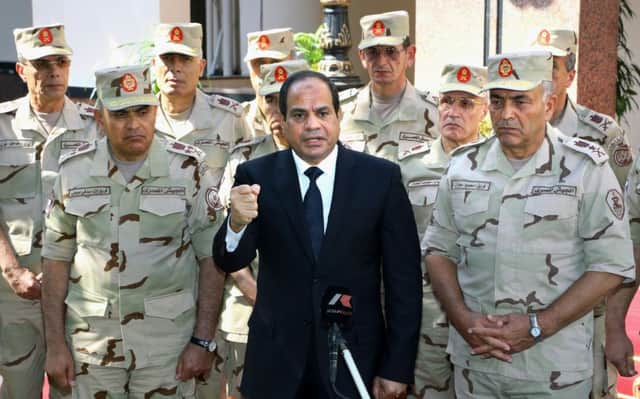IS offshoot attack on Egyptian police and army


An Egyptian militant group affiliated with the Islamic State (IS) claimed responsibility for the attacks, which involved locations in three Sinai towns, and showed a previously unseen level of co-ordination.
At least one suicide car bomb exploded outside a military base, while mortars were simultaneously fired at the base, toppling some buildings and leaving soldiers buried under the debris, officials said.
Among the dead were at least 25 soldiers and a policeman.
Advertisement
Hide AdAdvertisement
Hide AdHealth ministry officials said two civilians were also among those killed. A list of slain troops was released, showing three senior officers and adding that there were also unidentified bodies and body parts.
At least 60 people were wounded, some critically, health officials said, adding that the death toll was expected to rise.
An army spokesman blamed former Islamist president Mohamed Morsi’s Muslim Brotherhood for the assault.
Following the attack, president Abdel-Fattah al-Sisi cut short a trip to Ethiopia to return to Cairo, the state news agency reported.
In Washington, state department spokeswoman Jen Psaki condemned the attacks, adding that the “United States remains steadfast in its support of the Egyptian government’s efforts to combat the threat of terrorism in Egypt”.
The IS affiliate which claimed responsibility for the attack said on its Twitter account that two suicide bombers and three car bombs had targeted the army base and an adjacent security building in the provincial capital of el-Arish.
The posting called the attack “an extensive, simultaneous offensive for the soldiers of the caliphate” and listed at least eight checkpoints that were also targeted in the three locations – el-Arish, the nearby town of Sheik Zuwayid and the town of Rafah bordering Gaza.
Along with the military base, the other attacks included mortar rounds fired at a hotel, a police club and more than a dozen checkpoints.
Advertisement
Hide AdAdvertisement
Hide AdHours before the attack, the militant group posted on its Twitter account pictures of masked militants dressed in black. They were carrying rocket-propelled grenades in a show of force, while flying the IS black flag.
The group, previously known as Ansar Beit al-Maqdis, has launched several attacks against police and the army in Sinai in recent years. It was initially inspired by al-Qaeda, but last year it pledged allegiance to IS, which controls large parts of Syria and Iraq.
In November, it changed its name to Sinai Province, or Waliyat Sinai, reflecting its loyalty and subordination to IS.
Ahmed Samir, the army spokesman who blamed the Brotherhood, said in a posting on his official Facebook page that the attack was in response to “successful strikes” by army and police against terrorist elements in Sinai. He said security forces were exchanging gunfire with the militants.
Mr al-Sisi, the army chief-turned-president who led the ousting of Mr Morsi, has been depicted by nationalist media as the rescuer of Egypt from Islamic militancy. He led a crackdown on the Brotherhood, whose supporters had staged near daily demonstrations demanding Mr Morsi’s reinstatement, imprisoning thousands and killing hundreds in street protests.
In apparent retaliation, militants launched a spate of attacks that have ranged from homemade explosive devices to suicide bombings.